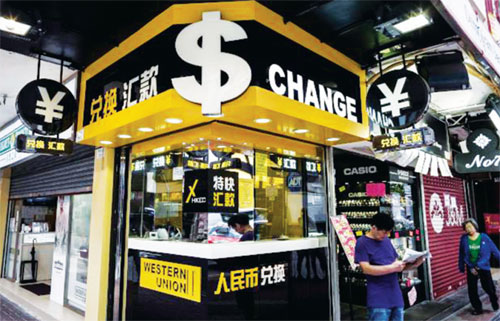Riders on the storm
Updated: 2015-09-04 07:15
By Oswald Chan(China Daily USA)
|
||||||||
|
It is feared a weaker yuan will hit the purchasing power of mainland visitors and further dent the already flagging tourism and retail figures in Hong Kong. Provided to China Daily |
Analysts see headwinds galore for the Hong Kong economy in the second half, with the shock yuan depreciation expected to be among factors exerting negative impacts. Oswald Chan reports.
On Aug 11, the People's Bank of China set the trading range of the yuan about 1.9 percent lower against the US dollar, allowing the currency to float at a more market-driven level against the greenback. In the week ended Aug 15, the yuan depreciated by nearly 4 percent.
A falling yuan exchange rate means declining purchasing power of the currency. While a cheaper yuan may help exporters, it exerts negative spillover effects on the Hong Kong tourism and retail sectors, because these two segments are heavily dependent on mainland tourist spending.
Hong Kong's total visitor arrivals from the mainland plummeted 8.4 percent to 49.2 million in July compared to last year, registering the largest single-month decline in six years, government data showed.
The slump was attributed to the 10 percent fall in mainland visitor arrivals and 3 percent drop in overseas visitor arrivals in July. That came after total tourist arrivals had already fallen by 2.9 percent on-year in June.
Between Aug 1 and Aug 15, total visitor arrivals declined another 2.1 percent, government data revealed. "Because of the (US-dollar) Linked Exchange Rate System (LERS), Hong Kong is no longer a cheap tourist destination, so that offering price discounts may not be an effective move to draw visitors," said Michael Wu Siu-ying, chairman of the Travel Industry Council of Hong Kong.
The Hong Kong dollar was pegged to the US dollar in 1983, amid financial market worries about Hong Kong's future ahead of the handover.
Under the LERS, the exchange rate movements of the Hong Kong dollar against other currencies depend entirely on the strength or weakness of the US dollar.
Recent economic data show that the US economy and jobs situation are gradually picking up, fueling market expectation that the US Federal Reserve may raise interest rates as early as September. Expectations of a US interest rate hike coupled with the renminbi depreciation have sparked a greenback rally against major currencies, with the US dollar index touching the highest level in nearly four months in mid-August.
With the Hong Kong dollar pegged to the US dollar, a rising greenback translates into a more expensive Hong Kong dollar compared with other global currencies, which hurts the city's tourism and retail sectors.
"The depreciation of the Japanese yen is prompting many mainland and overseas tourists to visit Japan," Wu noted. "Besides the currency rate factor, the relaxation of visa requirements for mainland tourists by many governments has also encouraged more of them to travel overseas rather than visit Hong Kong."
Wu believes that the Hong Kong tourism industry will enter a period of sluggishness and urged industry practitioners to diversify sources of visitor arrivals by reducing reliance on mainland visitors and attracting more tourists from South Korea and Southeast Asian countries.
Retail losing luster
Hong Kong retail sales have dropped in recent months as mainland visitors cut spending in the city. According to the Census and Statistics Department, total retail sales in the first half dropped 1.6 percent on-year, with the value of sales of jewelry, watches and clocks, and valuable gifts sinking by 15.9 percent in the same period.
"Yuan depreciation may have a negative impact on the local retail, tourism and catering sectors," Government Economist Helen Chan Lee Hoi-lun cautioned at press conference on Aug 14 to discuss data on the city's second quarter economic growth.
"The downward trend in inbound tourism is more entrenched that may poise to be one source of uncertainties to Hong Kong economic growth in the remaining months of this year. The performance of the Hong Kong economy in the second half of this year may not be better than the first half," Chan added.
A rising Hong Kong dollar not only hurts the local retail and tourism sector, it also hurts the export segment because an expensive Hong Kong dollar and a weaker-than-expected global economic recovery would crimp overseas demand.
"Hong Kong's trade will likely have contracted further given the weak regional trade data in July. In particular, the mainland trade slump in July indicates that Hong Kong's re-exports will suffer," said Liu Li-gang, Greater China chief economist at Australia and New Zealand Banking Corp.
Hong Kong's total export values (comprising re-exports and domestic exports) in July decreased 1.6 percent year-on-year to HK$320.9 billion after an annual decrease of 3.1 percent in June.
For the first seven months of 2015, the value of total goods exports dropped 0.2 percent compared with the same period in 2014.
Within this total, the value of re-exports remained virtually unchanged while the value of domestic exports plunged by 14 percent.
It is also feared that the stock market volatility triggered by the recent yuan depreciation may generate negative wealth effects to slash domestic consumption.
Wealth effect refers to the tendency for people to spend more when their financial asset values increase.
"Global stock market routs, unleashed by a faltering mainland economy, currency depreciation on the mainland and in emerging markets, and a possible US interest rate hike as early as September, will certainly affect the Hong Kong equity and property markets," Patrick Shum Hing-hung, investment manager at Tengard Fund Management, told China Daily.
"The Hong Kong share market has started to slump now and the city's property prices will probably not rise further this year. If this trend continues, it will create negative wealth effect on household consumption, which will eventually drag down the city's gross domestic product level," Shum said.
But other analysts are of the view that any negative consequences of renminbi depreciation should not be over-emphasized, and it may in fact be beneficial.
"Renminbi depreciation may help stabilize Hong Kong exports because re-exports constitute 98.6 percent of the city's total export value. A declining renminbi means that local re-exporters can source their products cheaper," Government Economist Chan noted.
"The recent yuan depreciation is a one-off measure by the central government to propel further yuan internationalization. When the yuan exchange rate becomes more flexible, it can play a greater role in adjusting the mainland economy. When the mainland economy become more flexible, resilient and sustainable, it will be good for Hong Kong," Chan explained.
Terence Chong Tai-leung, associate professor of Economics at Chinese University of Hong Kong, is also of the same opinion.
"More renminbi exchange-rate volatility could make its currency exchange rates more flexible, further pushing forward yuan internationalization and financial reforms. This can further cement Hong Kong's status as an offshore yuan financing center."
Contact the writer at oswald@chinadailyhk.com
- Hohhot overseas student pioneer park, core of 'Grassland Silicon Valley'
- Tight pollution controls affect major industries
- Tianjin announces pensions for martyred firefighters' families
- TCM tonic herb 'can kill HIV', study finds
- Intl Helicopter Exposition kicks off in Tianjin
- Premier Li commends nation's teachers
- Russian military experts present in Syria
- Norway PM says Norwegian citizen taken hostage in Syria
- Hungarian TV journalist fired for tripping up fleeing migrants
- Leaders from EU, Russia, Ukraine to meet in Paris in Oct
- Music is food for the soul for young Chinese violinist
- Australia's Tasmania, China agree to 'work together' on Antarctic expeditions

 Greedy panda eats ten boxes of honey
Greedy panda eats ten boxes of honey
 Soldiers in Sansha guard the islands
Soldiers in Sansha guard the islands
 Dunhuang heritage still alive in new age
Dunhuang heritage still alive in new age
 Bigger iPad announced at Apple 'monster' event
Bigger iPad announced at Apple 'monster' event
 World's largest mural on a giant rooftop
World's largest mural on a giant rooftop
 Starry Night: Van Gogh in Beijing
Starry Night: Van Gogh in Beijing
 Dog rescue leads to self-stabbing
Dog rescue leads to self-stabbing
 Serena vs Venus: Sibling rivalry as usual
Serena vs Venus: Sibling rivalry as usual
Most Viewed
Editor's Picks

|

|

|

|

|

|
Today's Top News
Inside look at Apple's newly-launched products
Peking Opera performance thrills NY
Chinese man, daughter arrested in alleged marriage scam
China's CPI up 2% in August
Hillary Clinton's lead eroded by Joe Biden's surge in poll
Apple TV comes with 'apps'; big iPad aimed at business
China aims to be first to land on far side of moon
Renowned scroll painting unrolled at the Palace Museum
US Weekly

|

|








